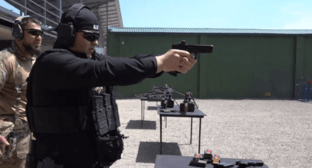23 December 2010, 22:10
Aslakhanov: stereotypes about Caucasians have nothing to do with real life
The participants of the press conference: "Who benefits from kindling interethnic enmity?" have called to break the existing negative stereotypes about different nations, including those originating from the Caucasus.
The participants of the press conference held on December 17 at the Russian News and Information Agency RIA "Novosti", in fact, tried to answer two questions: what had caused the December riots of nationalists and Caucasian youth in Moscow, St Petersburg, Rostov-on-Don and other cities and what should be done not to have the events of this kind repeated.
Valery Korovin, a lawyer from St Petersburg, noticed that much of the blame for what had happened lies with the militia, who released the suspected accomplices of the murder of the "Spartak" football fan Yegor Sviridov. "If persons are suspected of murder - why should they be released?" he asked.
Igor Rimmer, a member of the Legislative Assembly of St Petersburg, said that state authorities "are afraid to voice out the processes that take place," while those in localities "gives visitors a carte blanch that everything is possible." As an illustration of his words, Mr Rimmer mentioned the notorious Kondopoga, where according to his version, the reason for the pogroms that occurred in 2006 was that "15 families from Chechnya subjugated the entire economy." He also said that the newcomers "do not fit into the ideology of the Russian Orthodox state" and, thereby, arouse hostility to themselves.
Father Vsevolod Chaplin, head of the Synodal Division for Relations of the Church and Society of the Moscow Patriarchate, said that the riots were profitable to "extremist forces and those who wouldn't see Russia as a united, strong and independent power."
Aliy Totorkulov, Chairman of the Executive Committee of the Russian Congress of Caucasian Nations (RCCN) and head of the "Elbrusoid" Foundation for Promoting Kabardino-Balkaria Youth, agreed with Father Chaplin and noted that the events in Manege Square were beneficial both to Russian nationalists and to extremists from the Caucasus. "They all want a weakened and split-into-parts Russia," he said.
Nikolai Burlyaev, Chairman of the Union of Leaders of Slavic Culture and President of the "Zolotoi Vityaz" (Golden Knight) Slavic Arts Forum, noted that the blame for the conflict in on the media, which "have corrupted the society", and wrong migration policy.
In the discussion on how to prevent such situations in the future, Rinat Magdiev, chairman of the St Petersburg-based Tatar NGO named "Nur Plus", said that the interethnic dialogue is the key to solve the problems. He suggested Tatars as mediators and noted that they had already performed such mediating role between the Russian people and the peoples of the Caucasus and Central Asia.
Valery Korovin drew attention of the audience to the need for law enforcement officers to be "more correct in their wordings," when they are presenting data to media about these or those crimes. On the other hand, he noted the need to draft some common rules of conduct, to be followed also by the people from other regions, who arrive in the cities of Central Russia.
Father Vsevolod Chaplin offered "to give a chance to the Russian people and all other nations living in Russia to influence the socio-economic development of Russia." He also offered to integrate to the maximum the newcomers into the Russian society by means of courses of the Russian language, Russian culture, and acquaintance with the Orthodox Church and traditional Russian forms of Islam.
Aliy Totorkulov noted, in his turn, that in order to prevent interethnic clashes, the society should be based on universal values and the principle that "Freedom of one human ends where another's freedom begins." Touching on the allegations of non-integration of Caucasians into the Russian society, he noted that in Northern Caucasus children watch the same TV as in Moscow, read the same books and listen to same fairytales. According to the Chairman of the Executive Committee of the RCCN, an important milestone on the road to peace between nations will be to demolish the existing negative stereotypes about different nations, the creation of which is contributed a lot by the media.
The latter issue was developed by Aslanbek Aslakhanov, a member of the Council of Federation, who noted that in films Caucasians are given only negative roles. "What do we know now about a Caucasian? That he is a bastard, who is racing in his car and is engaged in banditry," said Mr Aslakhanov, who stressed that such stereotype has nothing to do with real life.
According to his story, another stereotype, which is actively disseminated by nationalists, that the Caucasus "lives at the expense of Russia, and which, according to the Senator, leads to separatism and insults the residents of the region, most of whom traditionally live quite modestly. To improve the situation, he offered to tell more in schools and universities about the nations of the Caucasus, and to organize meetings of young people.
Author: Semen Charnyj Source: CK correspondent




